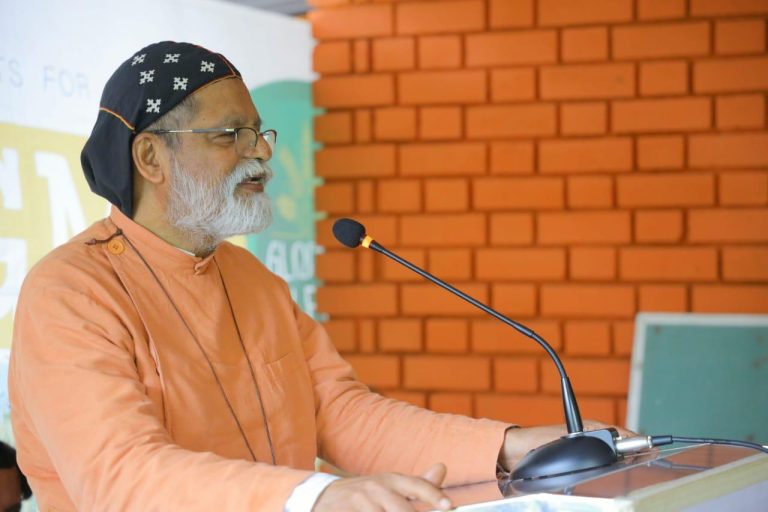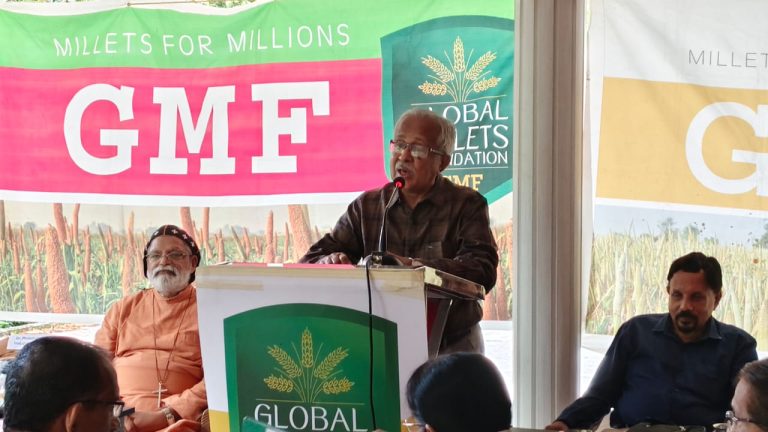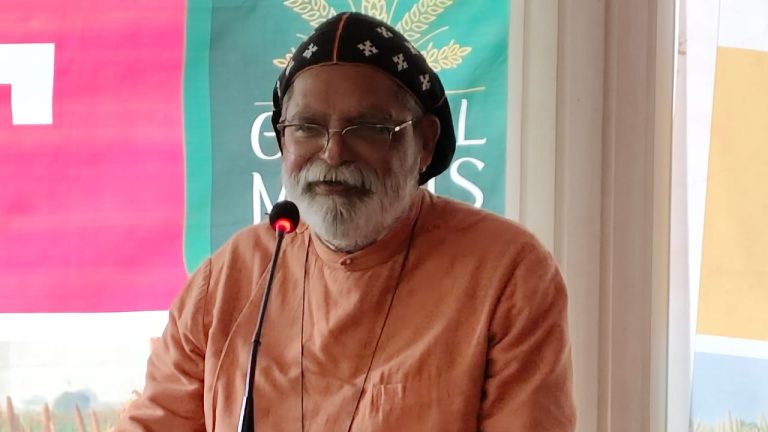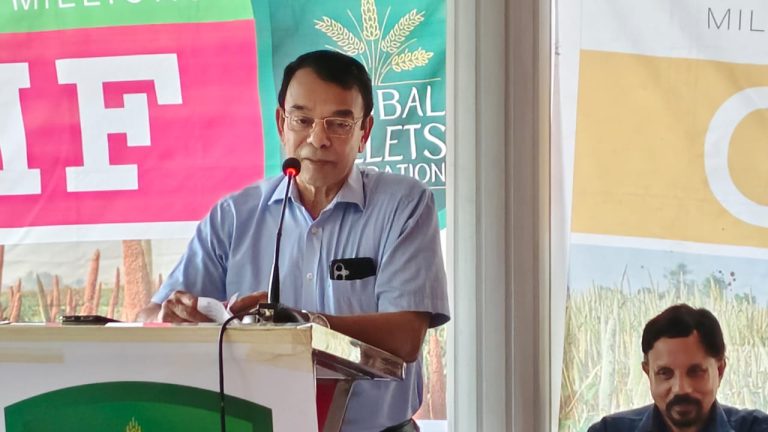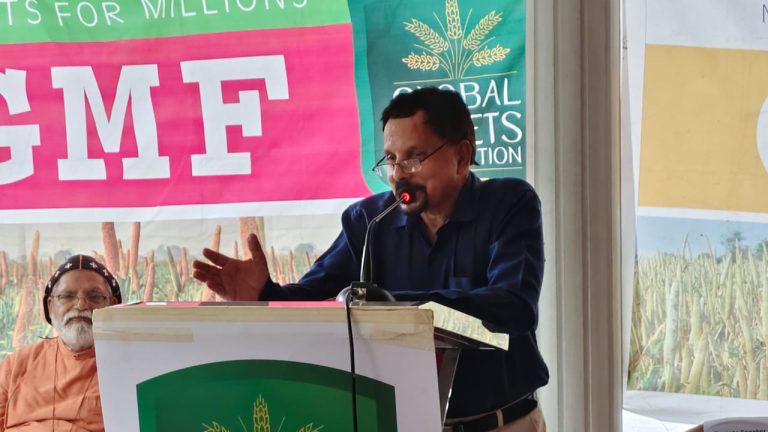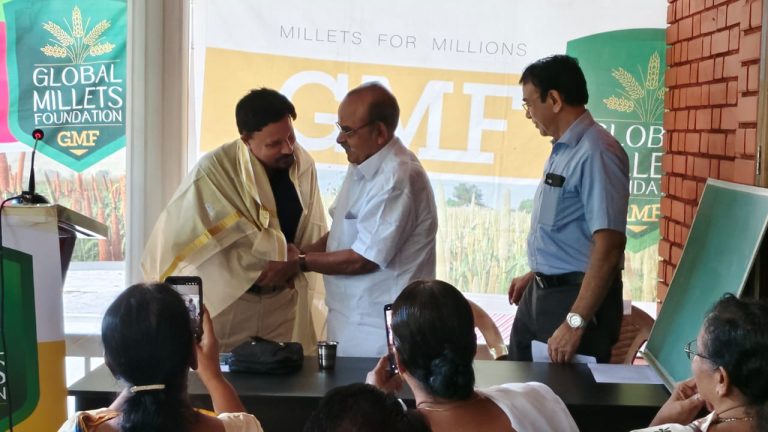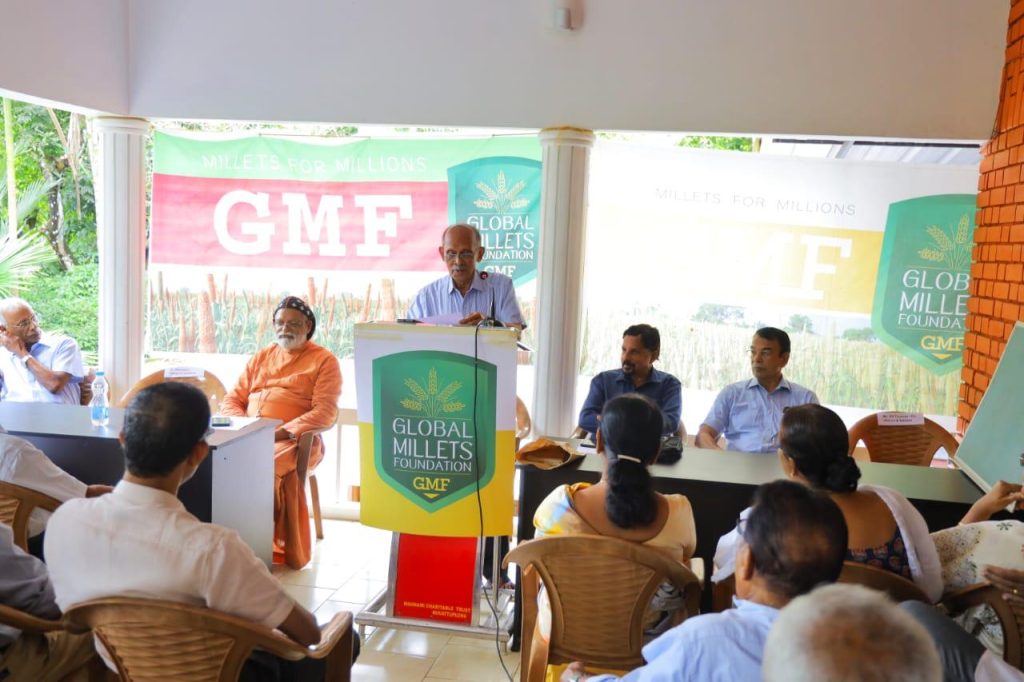
Control of the World by 0 & 1 through Air – Future Prospects and Frauds
Date & Venue: Sunday, 28 September 2025, 4:00 PM, Melmana Garden, Ooramana
Introduction
The Sustainable Development Forum (SDF), in collaboration with the Global Millets Foundation (GMF), organized its 175th seminar on Control of the World by 0 & 1 through Air – Future Prospects and Frauds at Melmana Garden, Ooramana, on 28 September 2025.
The event was chaired by Prof. Dr. Mathew Abraham and inaugurated by Dr. B. J. Meledom. Participants included academicians, professionals, social activists, entrepreneurs, law enforcement officials, and students, reflecting the Forum’s inclusive spirit and its commitment to broad-based dialogue.
Dr. K. M. George, in his welcome address, emphasized the significance of millets in sustainable living and highlighted the Forum’s evolving role in addressing wider societal, technological, and developmental challenges. He noted that while agriculture remains a cornerstone, SDF and GMF are equally committed to exploring contemporary issues of digital transformation, ethics, and security.
In his opening remarks, Prof. Dr. Mathew Abraham reminded participants that the Forum is nearing its milestone 200th seminar in 2026, a landmark event in its journey of knowledge-sharing and advocacy.
Inaugural Address
Dr. B. J. Meledom, in his inaugural speech, reflected on the transformative role of artificial intelligence, digital networks, and computer systems in everyday life. While acknowledging the immense benefits of technology, he cautioned against its potential misuse, emphasizing the need for vigilance and ethical responsibility in the digital era.
Keynote Address
The keynote address was delivered by Prof. Dr. Varghese Paul, Head of Department, CUSAT, on the theme:
“Control of the World by 0 & 1 through Air – Future Prospects and Frauds.”
1. Digital Transformation and Education
Dr. Paul explained how binary digits (0 and 1) underpin the digital universe, governing systems from computing to global communication. He highlighted how advances in digital networks have enabled online education, allowing postgraduate programs and research to flourish across borders.
2. Cryptography and Cybersecurity
Tracing the evolution of cryptography since 1995, Dr. Paul underlined its role in securing sensitive data. Despite the existence of over 100 encryption methods, cybercriminals continue to exploit system loopholes. He stressed the urgent need for stronger safeguards.
3. Internet of Things (IoT)
Illustrating the rise of “smart” systems, Dr. Paul described how mobile devices today can:
Start cars,
Lock/unlock doors,
Provide GPS navigation,
Control home appliances.
He further discussed driverless cars, metro automation, and aircraft instrument landing systems (ILS), all reliant on binary logic.
4. Computer Science vs. Information Technology
Dr. Paul distinguished between Computer Science (CS) and Information Technology (IT):
CS: Mathematical, algorithm-driven, focused on computing principles.
IT: Broader application, integrating CS with engineering and networking.
He summarized concisely: “IT = CS + Engineering.”
5. Data, Codes, and Standards
ASCII encodes characters (e.g., “A” = 01000001 in 8-bit).
Early computers (1940s) acted as calculators, whereas today they encode, decode, and transmit data globally.
Unicode expanded coding to multiple languages, with contributions like TDMRC coding developed by Dr. Paul for Malayalam.
6. Cybersecurity Challenges
Dr. Paul emphasized the vulnerabilities of weak passwords and identified major threats:
Viruses,
Phishing scams,
Cyber defamation,
Software piracy.
He urged adoption of robust security protocols and highlighted the critical need for resilience in financial systems such as those of the Reserve Bank of India.
7. Artificial Intelligence (AI)
Describing AI as a system that mimics human senses in data processing, Dr. Paul warned against blind reliance on AI outputs. He cited ChatGPT as an example—useful, yet requiring verification for accuracy.
Conclusion of Keynote
Dr. Paul concluded that binary digits invisibly govern the modern world—shaping education, banking, transportation, and communication. While opportunities abound, so do risks. He urged responsible adoption, ethical governance, and stronger cybersecurity frameworks.
His keynote address was met with high appreciation. Mr. Thomas Pulikkel honored Dr. Paul with a Ponnada.
Panel Discussions
Several distinguished speakers shared perspectives in three-minute interventions:
HG Dr. Thomas Athanasius, Metropolitan – Raised concerns on protecting ordinary citizens from digital scams and virtual arrests.
Dr. D. D. Namboothiri – Outlined the historical transition from traditional to digital systems.
Dr. Raghunathan Nair – Highlighted ethical and moral obligations in technology adoption.
Rev. Dr. Abin Abraham – Stressed balancing digital innovation with human values.
Er. K. P. Thankachan – Examined engineering vulnerabilities in digital systems.
Mr. Sunil Kumar (Samwarthika) – Discussed the influence of digital platforms on business models.
Mr. Raju Paul – Expressed concern about citizens becoming easy targets of online fraud.
Mr. A. M. Muhammed, IPS – Explained challenges faced by law enforcement in combating cybercrime.
Mr. Varghese Jacob – Advocated for widespread digital literacy.
Dr. Shivaprasad – Explored how AI and digital tools could empower traditional medicine, particularly Ayurveda.
Dr. A. P. Eldo – Called for educational reforms for digital preparedness.
Mrs. Sree Varsha – Emphasized mindful use of technology.
Interactive Session
Participants actively engaged in a Q&A session, raising issues related to:
Online financial fraud prevention,
Secure digital transaction mechanisms,
Ethical deployment of AI and machine learning,
Practical safety measures for everyday users.
Conclusion
The 175th seminar of SDF and GMF was a resounding success, offering deep insights into the promises and pitfalls of the digital age.
Key takeaways included:
Awareness of opportunities and risks in digital transformation,
The importance of ethics, responsibility, and digital literacy,
The Forum’s evolution from millet-centered sustainability discussions to addressing broader socio-technological challenges.
Dr. P. O. Abraham delivered the formal vote of thanks, summarizing the deliberations and appreciating the active participation that made the seminar vibrant and memorable.
The program concluded with optimism as participants looked forward to the 200th seminar milestone in 2026.
The evening closed with a traditional “millets-only” dinner, curated by Ms. Sofia M. S., with support from Dr. Raghunathan Nair and Ms. Sree Varsha—a fitting symbol of the Forum’s roots in sustainable living.
Acknowledgment
This Rapporteur’s Report was diligently prepared by Dr. Shivaprasad, Lead Rapporteur, despite many challenges. The Forum congratulates him for this excellent effort.
Dr. K. M. George
Secretary-General, Global Millets Foundation
CEO, Sustainable Development Forum
30 September 2025
www.globalmilletsfoundation.org

